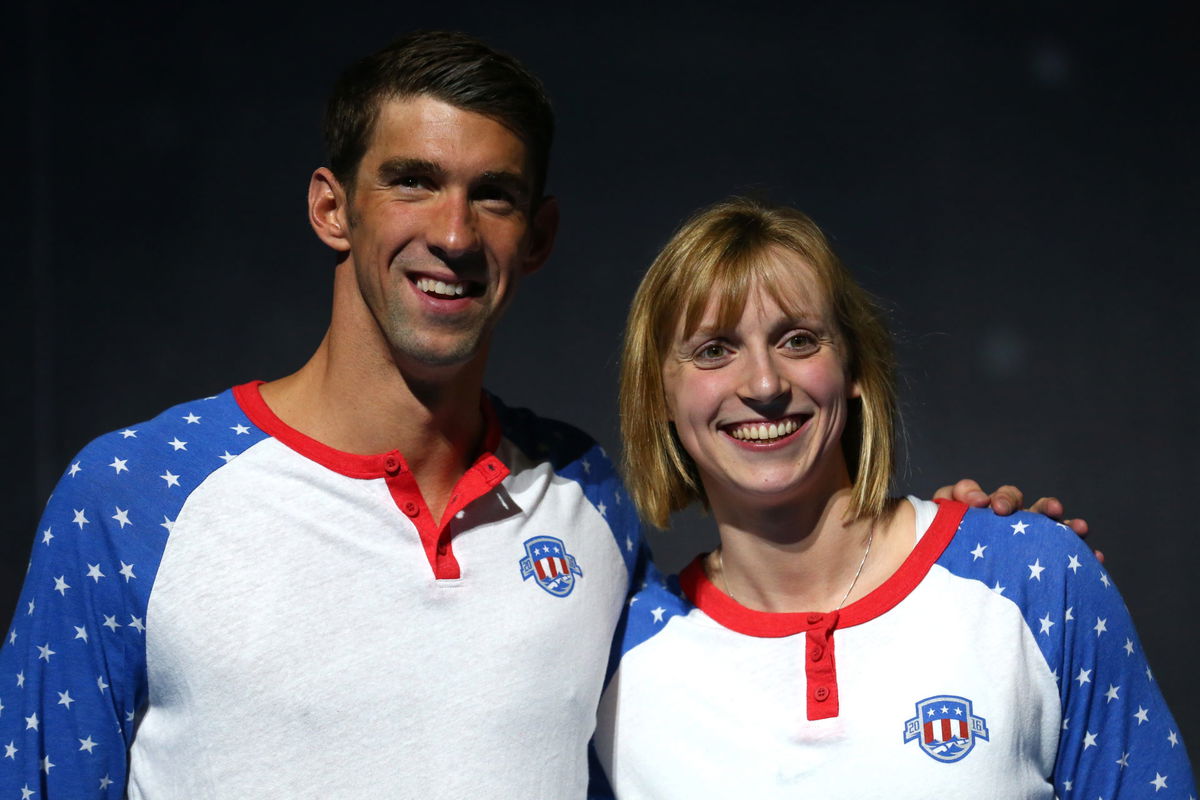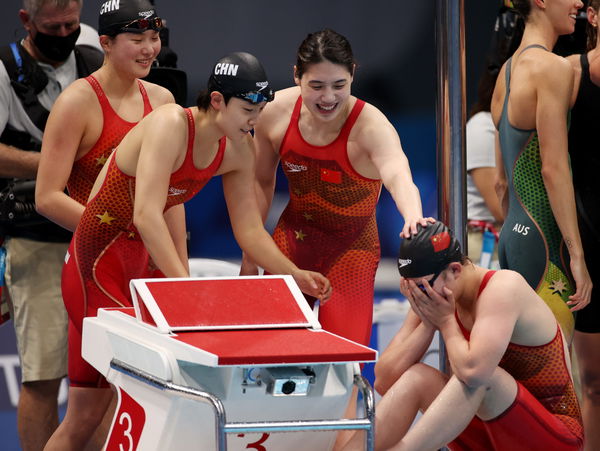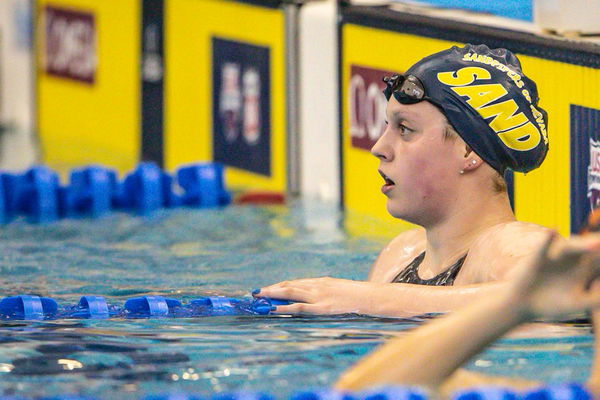
Getty
OMAHA, NE – JULY 03: (L-R) Michael Phelps and Katie Ledecky of the United States celebrate during Day Eight of the 2016 U.S. Olympic Team Swimming Trials at CenturyLink Center on July 3, 2016 in Omaha, Nebraska. (Photo by Tom Pennington/Getty Images)

Getty
OMAHA, NE – JULY 03: (L-R) Michael Phelps and Katie Ledecky of the United States celebrate during Day Eight of the 2016 U.S. Olympic Team Swimming Trials at CenturyLink Center on July 3, 2016 in Omaha, Nebraska. (Photo by Tom Pennington/Getty Images)
World Aquatics, which organized the Swimming World Cup 2023, has found itself in the middle of a boiling issue. The swimming fans were already upset with the federation for the high fare of entry at the Schwimm-und Sprunghalle in the Europa-Sportpark arena. To make things worse, the hyped elite swimmers performed miserably, making these fans feel like they were short-changed. However, a recent update from a popular sports analyst has taken the tension between the fans and the committee to a whole new level.
Watch What’s Trending Now!
Swimming fans love to support their favorite icons as they make history in the pool. One way to do so is to rewrite a world record or even a personal record. However, something was amiss in Berlin, but none could put their finger on it. That is until Kevin Pickard put out a tweet that pointed out the swimming meet’s problematic schedule and its effects on the health of the swimmers.
ADVERTISEMENT
Kevin Pickard’s shocking revelation
Kevin Pickard wrote an X post that had the fair warning of touching upon a heated issue plaguing the swimming world. The famous podcaster wrote, “1) Controversial post? I’m attending a meet this week (swimming competition for non-swimmer friends). I’ve raced competitively now for over 27 years through at all levels of domestic swimming. And what is happening this weekend is A) madness and B) a sign of why change is needed”. His post has resonated with the swimming fans who were unable to make sense of the poor performances at the Swimming World Cup 2023.
1) Controversial post?
I’m attending a meet this week (swimming competition for non-swimmer friends).
I’ve raced competitively now for over 27 years through at all levels of domestic swimming.
And what is happening this weekend is A) madness and B) a sign of why change is needed.— Kevin Pickard (@kevinpickard88) October 6, 2023
Pickard touched upon a sore issue of the athletes writing from experience, “I’m racing four events over the weekend… the grand total of time will be under 5 minutes of competition for me as a participant. My time on site for this event is 22 HOURS over two days”. This is definitely true in the case of the Swimming World Cup 2023, where the format and schedule did not consider the swimmer’s physical and mental well-being.
ADVERTISEMENT
The toll on athletes: minutes in the pool, hours on site
On the first day of the Swimming World Cup 2023, China’s Zhang Yufei made a controversial comment from the podium, calling the 200-meter finals “a horrible event”. While most people did not realize the significance of this assessment at first, now the matter has shed light on the challenges of the swimmers. After the morning heats that last only for a couple of seconds, many athletes competing in the short-course races must wait hours before the finals begin. There is a huge gap between the heats and the finals, which can be mentally and physically draining for the swimmers. This long wait time can disrupt their rhythm and make it difficult for them to maintain their peak performance during the finals.
ADVERTISEMENT

ADVERTISEMENT
Furthermore, most short-course swimmers compete in multiple events on any given day. They must endure the fatigue of the heat and wait for the finals to start in the evening. You would only need to look at the differences in results between the heats and the finals to understand the impact of this wait time. Take Torri Huske, for example, who had performed incredibly against Swedish champion Sarah Sjoestroem in the 50-meter freestyle heat yesterday. She posted 24.97 in the heats and came second, but in the finals, she could not match her rival’s speed and had to accept the third position.
Top Stories
NFL Makes Final Punishment Decision on Shedeur Sanders Incident in Week 17

Jerry Jones Finally Acknowledges the Dak Prescott Gamble Hasn’t Paid Off; Confirms Painful Changes Ahead for Cowboys

Chiefs Coach Abruptly Leaves Andy Reid’s Staff Amid Titans’ Rumored Interest in Matt Nagy

“I’d Be Dead”: NASCAR Legend Credits Kevin Harvick for Saving His Life

Two-Time Venezuelan UFC Champion Clears Stance on Trump’s Takeover and Maduro’s Capture

Kyle Whittingham Cuts Ties With Wink Martindale & Five Michigan Coaches in Major Shake-Up

On Saturday, Huske had two more heats, one in the 200-meter freestyle and another in her signature 50-meter butterfly event. She qualified for the finals in both events, staying in the pool for less than two minutes total. Now, she has to simmer till the finals to get rolling in the evening when she can reignite her engines once more. She is one of many athletes who have faced this issue at the Swimming World Cup 2023.
ADVERTISEMENT
Prolonged wait times are a challenge to swimmers
German sensations Lukas Martens and Florian Wellbrock were forced to abandon their finals yesterday after a mysterious illness suddenly struck them. Martens was favored for the 400-meter freestyle victory, but he could not continue his contention. Even more shocking was Claire Weinstein’s performance on both days of the Berlin meet. The swimming prodigy qualified for the Olympic Games at 13 years of age and also has a world title to her name.

ADVERTISEMENT
She was also the only American to outperform Katie Ledecky in the 200-meter freestyle in nine years. Yesterday in Berlin, she inspired confidence with an incredible finish in her heats and entered the finals in third place on the leaderboard. However, her dismal performance at the finals raised concerns about what went between the morning and evening races.
ADVERTISEMENT
Similarly, Isabel Gose of Germany fell down the rankings from the second-place finish in the heats to fifth place in the finals for the 400-meter freestyle. Her time also increased by over one second in the finals from the morning. She is due to race against Torri Huske, and Lani Pallister in the 200-meter finals tonight. It will be an interesting race to watch as it could prove the point we believe to be true.
Even veterans in the sport deplore the long wait times that affect their performance. American swimming legend Katie Ledecky once said, “I’m so not used to waiting until Day 3 to swim”. Swimming GOAT Michael Phelps called it an agonizing feeling and attributed the decline of his mental health to it. Now that he is on the mend, Phelps has taken up the cause of the swimmers in many campaigns.
Watch This Story: A Look at the Impeccable Performances of USA’s Power Swimmers Katie Ledecky and Katie Douglass in the World Aquatics Championship 2023
ADVERTISEMENT
ADVERTISEMENT
ADVERTISEMENT
ADVERTISEMENT

